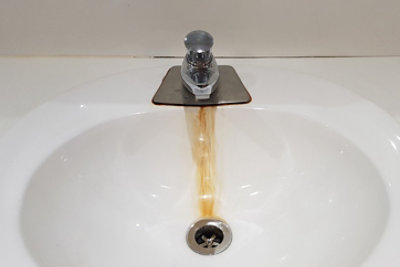Stop Wasting Water and Money. FIND A LOCAL PRO
You think you might have hard water. You’ve read our blog covering the telltale signs of hard water, and your Spidey senses are tingling. You want to test a sample of your tap water for hardness levels, but, frankly, you don’t know where to start. What are you looking for? Is there a water hardness scale?
Water hardness isn’t measured in daylights, in sunsets, in midnights, or cups of coffee. No, water hardness is most often measured in parts per million (ppm) or grains per gallon (gpg).
But let’s not jump ahead! First, a refresher on hard water and what it can mean for your home.
What Is Hard Water?
You want the water coming out of your tap to be refreshing, higher-quality water. When your water is hard, this means it contains minerals. Most minerals aren’t a health issue – magnesium and calcium are essential nutrients! However, hard water can affect your pipes, fixtures, and appliances in negative ways.
Hard water leaves behind signature traces in the form of mineral buildup. This buildup can clog pipes, stain sinks, and make washing your hands difficult. According to the Water Department of the City of Tucson, mineral buildup can shorten the lifespan of water-based appliances like water heaters, washing machines, and dishwashers.
We are water Experts
Water quality is non-negotiable. To prove it, we've built state-of-the-art water quality labs and filled them with the best and brightest scientists — all so we can provide you with the best water of your life.

How Is Water Hardness Measured?
There are two basic water hardness measurements: grains per gallon and parts per million.
According to the Encyclopaedia Britannica, grains per gallon is a measurement that originated as a measure of the weight of a dry wheat kernel. This ancient measurement is roughly equivalent to 1/7000 of a pound.
Parts per million, which can also be expressed as milligrams per liter (mg/L), is exactly what it sounds like: if you have 1 ppm water hardness, one out of one million units of your water is a hardness mineral.
Depending on your water hardness test, you may have to convert between the two measurements. It takes 17.1 ppm to equal 1 gpg, as noted in this fact sheet from the Connecticut Department of Public Health. So, if your water hardness measures 100 ppm, that would equal about 5.8 gpg.
How to Test Water Hardness at Home
We won’t leave you high and dry or your water hard. At Pentair Water Solutions, we connect customers with a water test.
Simply collect your tap water sample and send it back to us via a prepaid label.
Our water testing kits will measure your water hardness and test your water for 14 other contaminants, including lead, arsenic, and total dissolved solids (TDS).
What's in your water?
start here
Worried about your water? Take control with our at-home water test kit. We'll analyze your water and recommend the best filtration or softening solution for your specific needs.

Interpreting Water Hardness Test Results
So, is your water hard? If so, how high is your mineral content? Consult this table to find your water hardness solution.
American National Standards NSF/ANSI 44 and NSF/ANSI 330 consider 1 grain per gallon or higher indicative of hard water.
| Grains per Gallon | mg/L or ppm | Water Hardness |
| Less than one | Less than 17.1 | Soft |
| 1-3.5 | 17.1060 | Slightly hard |
| 3.5-7 | 60-120 | Moderately Hard |
| 7-10 | 120-180 | Hard |
| Over 10 | Over 180 | Very Hard |

Water 101
Unleash the secrets of your H2O! Explore where water originates and discover the various water filtration solutions that transform it into drinkable water.
Related Articles
Disclaimer: The information on this website has not been reviewed by the FDA. Products offered for sale herein are not intended to treat, cure or prevent any disease or health condition. No medical claims are being made or implied. Contaminants mentioned are not necessarily in your water.





